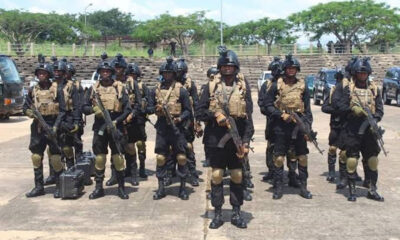Opinion
Wasiu Ayinde, Bobrisky and the Nigerian Army (2)

Wasiu Ayinde, Bobrisky and the Nigerian Army (2)
Tunde Odesola
(Published in The PUNCH, on Friday, April 12, 2024)
In this day and age of social media, journalism, one of the few fearless professions, treats soft news with almost the same attention it treats hard news. According to the Reuters Institute for the Study of Journalism, hard news refers to stories that are usually timely, important and consequential, such as politics, international affairs and business news. Soft news, on the other hand, includes entertainment, celebrity, and lifestyle stories.
Depending on their house styles, which are the rules guiding their news presentation, most media organisations across the country combine hard and soft news in varying proportions to reflect their mission and market.
Daily, serious dailies conduct editorial conferences to analyse and determine the news content for publication. One day, in one of such conferences in my newspaper office, talks centred around homosexuality. The newspaper’s Executive Director posed a question to editors at the conference: “Which one can you deal with: lesbians or gays?”
The majority of the editors at the conference said they could deal with lesbians much more than they could deal with gays. The editors agreed that cuddling, necking and pecking were synonymous with feminine cravings for TLC – tender, loving, care – an agelong potion which most women, especially lesbians seek with their partners. Notably, the editors didn’t see sex by lesbians as an abhorrent intrusion of the female genitals in the same way they saw the intrusion of the anal orifice in gay sex.
It’s, therefore, not a misrepresentation to say that the conference frowned on lesbians but scowled at gays.
The executive director later asked why lesbian practice got a frown and gay practice got a scowl. Offering different perspectives, editors at the editorial conference seemed not to view lesbianism with as much the same revulsion as they view gay practice. “Why?” the executive director asked. With scowls burrowing deeper on their faces, many of the editors submitted that gay practice was an intolerable violation of human anatomy. ‘Ayanma!’ ‘Tufiakwa!’ ‘God forbid!’ were some of the words that revealed the disgust the male-dominated gathering had for gays. Why do heterosexual men see lesbianism as a tolerable sin and consider gay practice as an intolerable sin?
Idris Olanrewaju Okuneye is a 33-year-old Nigeria biological male, who identifies as a woman. Okuneye, aka Bobrisky, calls herself the ‘Mummy of Lagos’, and goes about town wearing lavish (wo)manicure, peIDIcure, female clothes, shoes and accessories. Modern thesaurus minted new names for Bobrisky and her fellow risky boys. The names include cross-dresser, transvestite, ladyboy, drag queen, trannie, female impersonator etc. Bobrisky only openly identifies as a crossdresser and not as a gay or lesbian, with both practices and all shades of LGBTQIA outlawed in the country.
About three years ago, Bobrisky went under the knife and emerged with enhanced breasts but her big shoulders, square jaws and masculine neckline suggest that Idris’ anatomy remains a work in progress; a clay in the hands of her moulders. The medical risks involved in the creation of Bobrisky by surgeons imply she cannot be made in one day like God made Adam and Eve – without silicone implants, without cutting, grafting, puffing and patching.
Wahala! Wahala! Wahala! Wahala! Troublemaking is the oxygen of Nigeria’s reigning Most Controversial Musician, Habeeb Okikiola, aka Portable. A few days ago, Portable, the Ika of Africa (Africa’s Most Wicked), carried his portmanteau of wickedness to the house of Bobrisky after she was declared the Best Dressed Female at the premiere of a movie, Ajakaju, the Beast of Two Worlds. Bobrisky didn’t see what was coming when she called out Portable for criticising the female award given to her.
The self-styled Ika of Africa ran to the studio and came out with a monster hit titled Brotherhood, a song that tore Bobrisky apart. A few days after the musical dismantling of Bobrisky, the Economic and Financial Crimes Commission paraded the Mummy of Lagos for serial mutilation of Nigeria’s currencies at parties. Watching the sober Bobrisky at the EFCC Office, without makeup, was like watching the shed skin of a snake. Seeing Bobrisky’s EFCC mugshot displaying her four-inch fingernails must have been a sad display for Nigerians with queer sexuality. But it also offered a peep into how the Nigerian society views the encouragement by the United States of America for Nigeria to hop on the LGBTQIA train.
Decency forbids me from mentioning the unprintable names Portable employed in describing Bobrisky’s buttocks, but I advise Bobrisky to quickly ramp up her rump and put Portable to shame for comparing her expensive backside with akpu. In the musical eyes of Portable, the backside of Bobrisky doesn’t correspond with her voluminous upper body. To avoid being body-shamed by cynics like Portable, Bobrisky should, please, embark on a yansh shoot to wow Portable and her long list of clientele.
But I utterly disagree with the position of the Nigeria Police Force for saying its hands are tied on the sexuality of Bobrisky. In the wake of the reactions generated by the Ajakaju premiere and the Brotherhood song, the NPF said there was no Nigerian law forbidding cross-dressing. This position of the police is shallow and capable of causing the breakdown of law and order. The position protects only Bobrisky and his ilk, exposing the larger Nigerian populace to danger. The Force Public Relations Officer, Muyiwa Adejobi, a gentleman and friend, revealed the position of the police on Bobrisky in an interview.
With about 2,400 fitness gyms, US-headquartered fitness group, Planet Fitness Inc., is one of the largest fitness club franchises in the world. On March 21, 2024, the stocks of Planet Fitness lost $400m in valuation after the company revoked an American woman’s membership for snapping photos of a transgender woman, who was biologically male, shaving in a women’s locker room of Planet Fitness in Alaska.
Reports by Daily Mail, Fox Business, New York Post, and Newsweek, among other news outlets, said Patricia Silva, a white Alaskan woman was shocked to see a transgender woman shaving in the locker room while a preteen girl, who had come to use the locker room, watched in horror.
In a statement to Fox News Digital, Planet Fitness Chief Corporate Affairs Officer, McCall Gosselin, said Silva violated the company’s policy on gender identity. Gosselin said, “As the home of the Judgement Free Zone, Planet Fitness is committed to creating an inclusive environment. Our gender identity non-discrimination policy states that members and guests may use the gym facilities that best align with their sincere, self-reported gender identity. The member (Silva) who posted on social media violated our mobile device policy that prohibits taking photos of individuals in the locker room, which resulted in their membership being terminated.”
But Silva said, “There was “a little girl sitting in the corner. She could have been [12 years old] … in a towel kind of freaked out. I was offended, I took a picture of him.”
If the Nigeria Police Force subjected the Bobrisky issue to deep thought, it should have invited her with a view to determining her real sexuality so that the vagueness conferred on her sexuality by cross-dressing would be cleared. How would male and female police officers feel if Bobrisky appeared in their toilets? How would parents feel to have a Bobrisky in the same bathroom with their children? If there’s no law that prohibits Bobrisky from being a crossdresser, the police should, at least, ensure the safety of Nigerians using public toilets by protecting them from men who pose as crossdressers but have ulterior motives to hurt children and women, especially. This is why the need to determine Bobrisky’s real sexuality is a cause for public concern.
To be continued.
Email: tundeodes2003@yahoo.com
Facebook: @Tunde Odesola
X: @Tunde_Odesola
Opinion
El Rufai’s Arise News mind game with Ribadu, By Farooq Kperogi

El Rufai’s Arise News mind game with Ribadu, By Farooq Kperogi
El Rufai’s Arise News mind game with Ribadu, By Farooq Kperogi
Opinion
Oshiomhole: Behold the 13th disciple of Christ

Oshiomhole: Behold the 13th disciple of Christ
Opinion
AFCON 2025: Flipping Content Creation From Coverage to Strategy

AFCON 2025: Flipping Content Creation From Coverage to Strategy
By Toluwalope Shodunke
The beautiful and enchanting butterfly called the Africa Cup of Nations (AFCON) emerged from its chrysalis in Khartoum, Sudan, under the presidency of Abdelaziz Abdallah Salem, an Egyptian, with three countries—Egypt, Sudan, and Ethiopia—participating, and Egypt emerging as the eventual winner.
The reason for this limited participation is not far-fetched. At the time, only nine African countries were independent. The remaining 45 countries that now make up CAF’s 54 member nations were either pushing Queen Elizabeth’s dogsled made unique with the Union Jack, making supplications at the Eiffel Tower, or knocking at the doors of the Palácio de Belém, the Quirinal Palace, and the Royal Palace of Brussels—seeking the mercies of their colonial masters who, without regard for cultures, sub-cultures, or primordial affinities, divided Africa among the colonial gods.
From then until now, CAF has had seven presidents, including Patrice Motsepe, who was elected as the seventh president in 2021. With more countries gaining independence and under various CAF leaderships, AFCON has undergone several reforms—transforming from a “backyard event” involving only three nations into competitions featuring 8, 16, and now 24 teams. It has evolved into a global spectacle consumed by millions worldwide.
Looking back, I can trace my personal connection to AFCON to table soccer, which I played alone on concrete in our balcony at Olafimihan Street—between Mushin and Ilasamaja—adjacent to Alafia Oluwa Primary School, close to Alfa Nda and Akanro Street, all in Lagos State.
Zygmunt Bauman, the Polish-British sociologist who developed the concept of “liquid modernity,” argues that the world is in constant flux rather than static, among other themes in his revelatory works.
For the benefit of Millennials (Generation Y) and Generation Z—who are accustomed to high-tech pads, iPhones, AI technologies, and chat boxes—table soccer is a replica of football played with bottle corks (often from carbonated drinks or beer) as players, cassette hubs as the ball, and “Bic” biro covers for engagement. The game can be played by two people, each controlling eleven players.
I, however, enjoyed playing alone in a secluded area, running my own commentary like the great Ernest Okonkwo, Yinka Craig, and Fabio Lanipekun, who are all late. At the time, I knew next to nothing about the Africa Cup of Nations. Yet, I named my cork players after Nigerian legends such as Segun Odegbami, Godwin Odiye, Aloysius Atuegbu, Tunji Banjo, Muda Lawal, Felix Owolabi, and Adokiye Amiesimaka, among others, as I must have taken to heart their names from commentary and utterances of my uncles resulting from sporadic and wild celebrations of Nigeria winning the Cup of Nations on home soil for the first time.
While my connection to AFCON remained somewhat ephemeral until Libya 1982, my AFCON anecdotes became deeply rooted in Abidjan 1984, where Cameroon defeated Nigeria 3–1. The name Théophile Abéga was etched into my youthful memory.
Even as I write this, I remember the silence that enveloped our compound after the final whistle.
It felt similar to how Ukrainians experienced the Battle of Mariupol against Russia—where resolute resistance eventually succumbed to overwhelming force.
The Indomitable Lions were better and superior in every aspect. The lion not only caged the Eagles, they cooked pepper soup with the Green Eagles.
In Maroc ’88, I again tasted defeat with the Green Eagles (now Super Eagles), coached by the German Manfred Höner. Players like Henry Nwosu, Stephen Keshi, Sunday Eboigbe, Bright Omolara, Rashidi Yekini, Austin Eguavoen, Peter Rufai, Folorunsho Okenla, Ademola Adeshina, Yisa Sofoluwe, and others featured prominently. A beautiful goal by Henry Nwosu—then a diminutive ACB Lagos player—was controversially disallowed.
This sparked outrage among Nigerians, many of whom believed the referee acted under the influence of Issa Hayatou, the Cameroonian who served as CAF president from 1988 to 2017.
This stroll down memory lane illustrates that controversy and allegations of biased officiating have long been part of AFCON’s history.
The 2025 Africa Cup of Nations in Morocco, held from December 21, 2025, to January 18, 2026, will be discussed for a long time by football historians, raconteurs, and aficionados—for both positive and negative reasons.
These include Morocco’s world-class facilities, the ravenous hunger of ball boys and players (superstars included) for the towels of opposing goalkeepers—popularly dubbed TowelGate—allegations of biased officiating, strained relations among Arab African nations (Egypt, Algeria, Tunisia, and Morocco), CAF President Patrice Motsepe’s curt “keep quiet” response to veteran journalist Osasu Obayiuwana regarding the proposed four-year AFCON cycle post-2028, and the “Oga Patapata” incident, where Senegalese players walked off the pitch after a legitimate goal was chalked off and a penalty awarded against them by DR Congo referee Jean-Jacques Ndala.
While these narratives dominated global discourse, another critical issue—less prominent but equally important—emerged within Nigeria’s media and content-creation landscape.
Following Nigeria’s qualification from the group stage, the Super Eagles were scheduled to face Mozambique in the Round of 16. Between January 1 and January 3, Coach Eric Chelle instituted closed-door training sessions, denying journalists and content creators access, with media interaction limited to pre-match press conferences.
According to Chelle, the knockout stage demanded “maximum concentration,” and privacy was necessary to protect players from distractions.
This decision sparked mixed reactions on social media.
Twitter user @QualityQuadry wrote:
“What Eric Chelle is doing to journalists is bad.
Journalists were subjected to a media parley under cold weather in an open field for the first time in Super Eagles history.
Journalists were beaten by rain because Chelle doesn’t want journalists around the camp.
Locking down training sessions for three days is unprofessional.
I wish him well against Mozambique.”
Another user, @PoojaMedia, stated:
“Again, Eric Chelle has closed the Super Eagles’ training today.
That means journalists in Morocco won’t have access to the team for three straight days ahead of the Round of 16.
This is serious and sad for journalists who spent millions to get content around the team.
We move.”
Conversely, @sportsdokitor wrote:
“I’m not Eric Chelle’s biggest supporter, but on this issue, I support him 110%.
There’s a time to speak and a time to train.
Let the boys focus on why they’re in Morocco—they’re not here for your content creation.”
From these three tweets, one can see accessibility being clothed in beautiful garments. Two of the tweets suggest that there is only one way to get to the zenith of Mount Kilimanjaro, when indeed there are many routes—if we think within the box, not outside the box as we’ve not exhausted the content inside the box.
In the past, when the economy was buoyant, media organisations sponsored reporters to cover the World Cup, Olympics, Commonwealth Games, and other international competitions.
Today, with financial pressures mounting, many journalists and content creators seek collaborations and sponsorships from corporations and tech startups to cover sporting events, who in turn get awareness, brand visibility, and other intangibles.
As Gary Vaynerchuk famously said, “Every company is a media company.” Yet most creators covering AFCON 2025 followed the same playbook.
At AFCON 2025, most Nigerian journalists and content creators pitched similar offerings: on-the-ground coverage, press conferences, team updates, behind-the-scenes footage, analysis, cuisine, fan interactions, and Moroccan cultural experiences.
If they were not interviewing Victor Osimhen, they were showcasing the stand-up comedy talents of Samuel Chukwueze and other forms of entertainment.
What was missing was differentiation. No clear Unique Selling Proposition (USP). The result was generic, repetitive content with little strategic distinction. Everyone appeared to be deploying the same “Jab, Jab, Jab, Hook” formula—throwing multiple jabs of access-driven content in the hope that one hook would land.
The lesson is simple: when everyone is jabbing the same way, the hook becomes predictable and loses its power.
As J. P. Clark wrote in the poem “The Casualties”, “We are all casualties,” casualties of sameness—content without differentiation. The audience consumes shallow content, sponsors lose return on investment, and creators return home bearing the “weight of paper” from disappointed benefactors.
On November 23, 1963, a shining light was dimmed in America when President John F. Kennedy was assassinated.
As with AFCON today, media organisations sent their best hands to cover the funeral, as the who’s who of the planet—and if possible, the stratosphere—would attend. Unconfirmed reports suggested that over 220 VVIPs were expected.
While every newspaper, radio, and television station covered the spectacle and grandeur of the event, one man, Jimmy Breslin, swam against the tide. He chose instead to interview Clifton Pollard, the foreman of gravediggers at Arlington National Cemetery—the man who dug John F. Kennedy’s grave.
This act of upended thinking differentiated Jimmy Breslin from the odds and sods, and he went on to win the Pulitzer Prize in 1986.
Until journalists and content creators stop following the motley and begin swimming against the tide, access will continue to be treated as king—when in reality, differentiation, aided by strategy, is king.
When every journalist and content creator is using Gary Vaynerchuk’s “Jab, Jab, Jab, Hook” template while covering major sporting events, thinkers among them must learn to replace one jab with a counterpunch—and a bit of head movement—to stay ahead of the herd.
Toluwalope Shodunke can be reached via tolushodunke@yahoo.com
-

 metro3 days ago
metro3 days agoIKEDC Sets Feb 20 Deadline for Customers to Submit Valid IDs or Face Disconnection
-

 Education3 days ago
Education3 days agoSupreme Court Affirms Muslim Students’ Right to Worship at Rivers State University
-

 News2 days ago
News2 days agoAso Rock Goes Solar as Tinubu Orders National Grid Disconnection
-

 metro2 days ago
metro2 days agoLagos Police Launch Manhunt for Suspect in Brutal Ajah Murder
-

 Business3 days ago
Business3 days agoNaira Could Trade Below ₦1,000/$ With Dangote Refinery at Full Capacity — Otedola
-

 metro3 days ago
metro3 days agoArmy University Professor Dies in Boko Haram Captivity After Nearly One Year
-

 International3 days ago
International3 days agoTrump Halts Minnesota Immigration Crackdown After Fatal Shootings, Protests
-

 Sports2 days ago
Sports2 days agoLookman Shines as Atlético Madrid Hammer Barcelona 4-0















